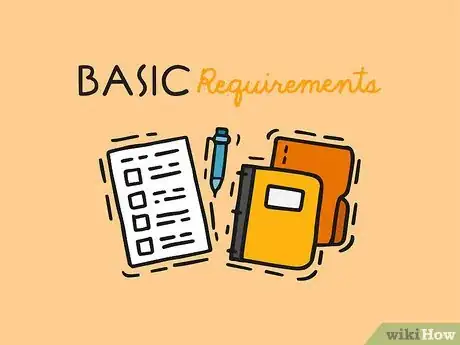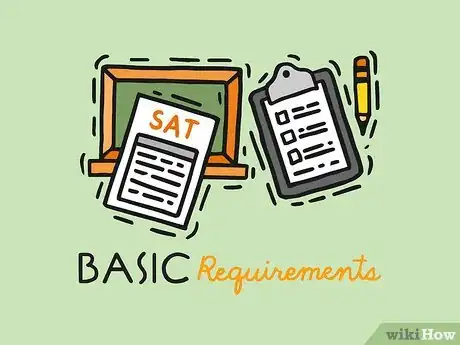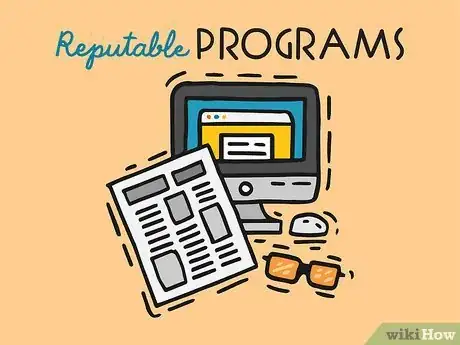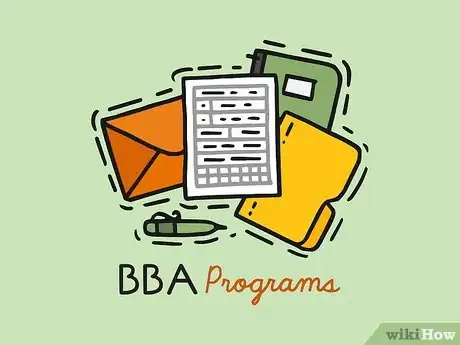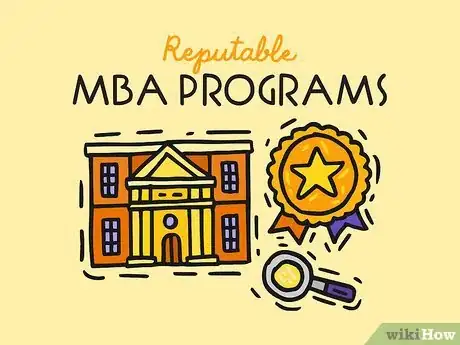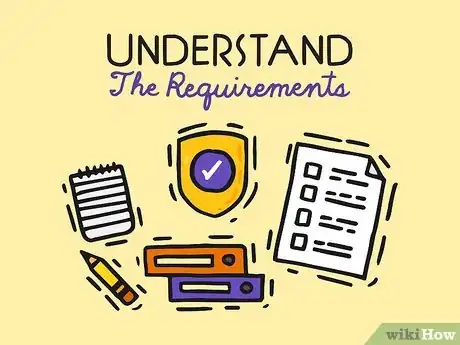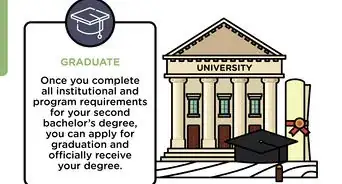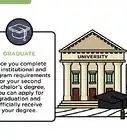This article was co-authored by Katherine Demby. Katherine Demby is an Academic Consultant based in New York City. Katherine specializes in tutoring for the LSAT, GRE, SAT, ACT, and academic subjects for high school and college students. She holds a BA in History and Political Science from the University of North Carolina at Chapel Hill and a JD from Yale Law School. Katherine is also a freelance writer and editor.
There are 12 references cited in this article, which can be found at the bottom of the page.
This article has been viewed 58,106 times.
Business administration is one of the most lucrative degrees available. However, the options to interested students are almost limitless, with thousands of universities and several different degree levels. Choosing a course is partially contingent upon your own circumstances, particularly how much time and money you can devote to your education. However, the first step toward making an educated choice is familiarizing yourself with your options.
Steps
Understanding Business Administration Programs
-
1Consider what skills you will learn. The function of business administration is to teach you how to manage groups of people. Programs will focus on cultivating your communication skills, on preparing you to make tough decisions, and to organize teams. Oftentimes instruction in computer skills are important as well.[1]
-
2Understand available careers. Degrees in business administration are not just useful for the public sector; they can be equally as effective in helping you to organize departments in government or at universities. A degree in business administration is applicable to any job that requires active management of employees.
- Examples include accountant, administrative executive, banker, chief executive officer, city manager, controller, consultant, department store manager, director, human resource manager, public relations specialist, retail manager, and school administrator.[2]
Advertisement -
3Know when to get a higher degree. Each type of degree will qualify for better jobs, but it will also take time, and possibly a lot of money. If you feel that you have reached a dead end in your career and have the capacity and desire to do something more, consider going back for more education.
- If your aspirations are entrepreneurial, you might want to reconsider getting an MBA or higher degree, because these can hinder your ability to develop the necessary capital to start your own business.
- The payoff of degrees past the bachelor’s level can also be highly contingent upon the rank of your university. If you aren’t qualified for a top-tier program, consider building some better credentials first.[3]
Getting an Associate of Business Administration
-
1Research what an associate degree can do for you. An associate degree usually will not get you a major management job in the financial industry. But it will qualify you for a management position in the service industry or middle management jobs in an office environment. An associate degree will also help you gain admittance into a bachelor’s program and may give you credits for such a program as well.[4]
- An associate degree will teach you all of the basics of management and might provide you some skills for specialized industries like health care administration and human resources.[5]
-
2Meet basic requirements. Most programs will require that you have a high school degree or equivalent: i.e. a GED. You will possibly also be required to have an SAT score.[6]
-
3Research colleges for you. Most nearby community colleges should offer an associate degree in business administration. There are also an array of online programs for associate degrees. These will make it easier to attend if you are already in the middle of your career, however, not all such programs are credible.
- To verify that the school you are interested in a credible ranking, research its accreditation. An accreditation by the Association of Advanced Collegiate Schools of Business (AACSB) is only available to programs with a strong record of scholarly research and is generally considered the gold standard. However, programs accredited by the Accreditation Council for Business Schools and Programs (ACBSP) should also be of a reasonable standard.[7]
-
4Pick programs that fit your life. Some programs specialize in certain types of careers and are more appropriate for your objectives. Some are more flexible for part time students or offer more reasonable tuition. Consider all of these factors and pick three of four institutions that stand out for you.
- Review the school’s website to see if they offer any specialized degrees in careers that you are interested. Look up the faculty biographies to see if they have experience or connections to fields that you are interested in.
-
5Apply. Once you’ve completed all of your requirements and found programs that you are interested in, apply. Try to apply to several programs, in case you get rejected.
-
6Earn your degree. An associate degree will typically take two years. However, they should be flexible and it is possible that you could finish it either later or earlier than this, if that is the best option for your lifestyle.
Getting a Bachelor’ of Business Administration
-
1Research what a bachelor’s in business administration is. A bachelor’s is the standard in higher education. For a degree in business administration, you will required to understand general theories of business organization and, quite possibly, specialize in a particular field. Applicants with a bachelor’s in business administration will be considered eligible for a wide variety of occupations.
-
2Prepare for a long haul. A bachelor’s degree will take approximately four years of rigorous work. You will find it difficult to complete such a degree on a part time basis. Expect to dedicate four years of your life to the degree and apply to reputable programs that are likely to have more generous financial aid offerings.
- Examples of careers available with a bachelor’s in business administration include: business analyst, human resources generalist, operations managers, or marketing specialists. A BA is typically also a good degree to begin your own entrepreneurial ventures with.[8]
-
3Meet basic requirements. Typically you will be required to have a high school degree or have passed the GRE. You will also need to have an SAT score. If you have received an associate degree, you can also include this in your application. This will demonstrate your commitment to higher education.
-
4Look for reputable programs. US News and World Report ranks the top business schools in the country, including schools that are best for specific fields like Management or International Business.[9] If you are interested in colleges that aren’t on this list, verify that they are accredited.
- Preference should be given to business programs that are accredited by Association of Advanced Collegiate Schools of Business, but those accredited by the Accreditation Council for Business Schools and Programs should also be reputable.
-
5Apply to several BBA programs. It is important to cast a wide net to get into the best business program that you can. While sometimes there are factors that make it impossible to relocate or dedicate yourself to a full time degree, you should find the best bachelor’s program available to you. There is a huge discrepancy in the earning power of even top-tier bachelor’s programs.
- The difference between the mid-career earnings of a student from the most lucrative business program (the University of California-Berkeley) and the fifteenth ranked program (the University of Southern California) is $37,000 per year. Not all programs are created equal.[10]
-
6Complete a degree. Expect to finish a core curriculum of business classes before beginning a specialization. Try to have a clear sense of what you want to do. Keep your grades up, because popular business programs are often “impacted” – that means you might be forced into a different major if you do not keep your grades up.[11]
Getting a Master of Business Administration
-
1Research what you can do with a master’s degree. The MBA is the most popular type of professional degree in the world.[12] A master’s in business is a high level degree that prepares you for a variety of top-tier executive jobs. In most situations, an MBA is well qualified to be at the top of a business.[13]
-
2Understand when to pursue an MBA. A MBA is typically acquired mid-career program completed several years after your undergraduate degree. If you find that your career has stalled prematurely, you should consider an MBA. They are often friendly to those in the middle of their career, in that they are can be as short as one year, and might be possible to obtain part time.
- Alternatively, some bachelor’s programs allow you to earn a MBA with an extra year of course work. This can often be the quickest and easiest way to get an MBA.[14]
- Since the economic downturn, demand for MBA’s has decreased. Because of the expense of MBA programs it often is no longer valuable to get an MBA unless it comes from a top tier university.[15]
-
3Meet requirements. For a master’s degree you will need a bachelor’s degree in hand. You will also need to take one of two tests, either the GMAT or the GRE. For more exclusive programs, you often need to demonstrate several years of good job performance as well. You will need to write a statement of purpose demonstrating that you have the commitment and desire for the program.
- Experience in the business world is essential to gaining admission to an MBA program. While undergraduate participation in business-related activities, such as internships or business fraternities, will help you gain admission, there is no substitute for full-time work in a business setting.
- To demonstrate work experience you will typically be required to collect letters of recommendation.[16]
- The GMAT is a standardized test required for admission to most MBA programs. It is administered by the Graduate Management Admissions Council several times throughout the year at several locations and costs $250.
- Alternatively, some schools require a GRE, which is similar to the SAT.
-
4Find a quality MBA program. US News and World Reports ranks MBA’s according to specialties and even ranks part time programs.[17] If you don’t have the credentials for these programs, consult the ACBSP for a list of other reputable MBA programs.
-
5Apply to several MBA programs. Because many such programs are selective, try to apply to at least six. Having options will be valuable when you’re picking a program.
-
6Pick a program. Many factors should influence your decision. Some to consider include tuition, location, reputation, and flexibility. If you need to work during your program, seriously consider what part time options are available or how long the degree will be. Although two years is a standard time to graduation, some programs now offer one year degrees.
- Research the earning power of graduates from the program. Many MBA’s are not as profitable as they used to be. You might find that the student loan debt required for the program is not worth the payoff.[18]
Getting a Doctorate of Business Administration
-
1Understand the difference between a DBA and a PhD. While similar, a Doctor of Business Administration is oriented toward the practical application of theory, while a PhD is focused on theoretical research and education.
- A DBA is reserved for high level executives who want to introduce new theories into their organization. The program will be three years on part time bass and will require an MBA. You should have approximately 15 years of management experience, half of which is on the executive level.
- The PhD on the other hand is 4-5 years, full time and does not require an MBA or work experience. The PhD is principally for people who want to teach business but can be for used by consultants or think tanks interested in abstract research.
-
2Understand the requirements. For both the DBA and the PhD you will be required to have a bachelor’s degree, and GMAT scores. The DBA will also require substantial several years of experience as an executive and an MBA. Those things are preferred for a PhD, but might not be required.
-
3Contact faculty. Both a DBA and a PhD are highly specialized degrees. You will want to find faculty that specialize in your areas of interest. Research faculty that have published extensively on your field of interest. Contact them to discuss your work and whether they could advance your knowledge of the subject.
- If you aren’t aware of the academic leaders in your field, do a google scholar search of relevant key words and see which names occur most frequently.
Community Q&A
-
QuestionIs it hard to get into a business administration program?
 Katherine DembyKatherine Demby is an Academic Consultant based in New York City. Katherine specializes in tutoring for the LSAT, GRE, SAT, ACT, and academic subjects for high school and college students. She holds a BA in History and Political Science from the University of North Carolina at Chapel Hill and a JD from Yale Law School. Katherine is also a freelance writer and editor.
Katherine DembyKatherine Demby is an Academic Consultant based in New York City. Katherine specializes in tutoring for the LSAT, GRE, SAT, ACT, and academic subjects for high school and college students. She holds a BA in History and Political Science from the University of North Carolina at Chapel Hill and a JD from Yale Law School. Katherine is also a freelance writer and editor.
Test Prep Specialist Associate-degree programs are designed to be foundational, so they typically aren't exceptionally difficult to get into.
Associate-degree programs are designed to be foundational, so they typically aren't exceptionally difficult to get into. -
QuestionWhat do I need to do and which documents (credentials) will I need to apply for an associate or any other degree in Business Administration in the US?
 Brian Salazar-PrinceTop AnswererIn order to attend college in the US to obtain an associate degree, you will need to provide validation of your previous education through an organization such as the World Education Service. You will also need to prove English language proficiency and obtain a student visa. Community colleges, where associate degrees are awarded, are generally open-entry, meaning you do not have to have the ACT or SAT, but you will need to take a placement test at the school to determine your courses or English, Math, and Reading. If you locate a school of interest, they will most likely have an International Students' Office which can help you obtain the documentation needed for a student visa.
Brian Salazar-PrinceTop AnswererIn order to attend college in the US to obtain an associate degree, you will need to provide validation of your previous education through an organization such as the World Education Service. You will also need to prove English language proficiency and obtain a student visa. Community colleges, where associate degrees are awarded, are generally open-entry, meaning you do not have to have the ACT or SAT, but you will need to take a placement test at the school to determine your courses or English, Math, and Reading. If you locate a school of interest, they will most likely have an International Students' Office which can help you obtain the documentation needed for a student visa.
References
- ↑ http://www.sonoma.edu/career/majors/business.html
- ↑ http://www.sonoma.edu/career/majors/business.html
- ↑ http://poetsandquants.com/2012/06/14/where-mba-career-pay-totals-3-million-plus/3/
- ↑ Katherine Demby. Test Prep Specialist. Expert Interview. 17 December 2020.
- ↑ http://www.allbusinessschools.com/business-careers/business-administration/degrees/
- ↑ Katherine Demby. Test Prep Specialist. Expert Interview. 17 December 2020.
- ↑ http://www.allbusinessschools.com/business-careers/article/business-school-accreditation/
- ↑ http://www.allbusinessschools.com/business-careers/business-administration/degrees/
- ↑ http://colleges.usnews.rankingsandreviews.com/best-colleges/rankings/business
- ↑ http://www.payscale.com/college-salary-report/best-schools-by-majors/business
- ↑ http://www.allbusinessschools.com/business-careers/business-administration/degrees/
- ↑ http://find-mba.com/what-is-an-mba
- ↑ http://www.allbusinessschools.com/business-careers/business-administration/degrees/
- ↑ http://www.allbusinessschools.com/business-careers/business-administration/degrees/
- ↑ http://www.ft.com/intl/cms/s/2/89ea8d64-a31a-11e4-9c06-00144feab7de.html#axzz3pKBoN0uF
- ↑ http://find-mba.com/what-is-an-mba
- ↑ http://grad-schools.usnews.rankingsandreviews.com/best-graduate-schools/top-business-schools
- ↑ http://www.ft.com/intl/cms/s/2/89ea8d64-a31a-11e4-9c06-00144feab7de.html#axzz3pKBoN0uF





